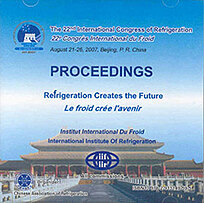
IIR document
Expansion devices for CO2: results of measurements and simulation model.
Author(s) : MARTIN K., RIEBERER R.
Summary
This paper presents experimental data and a model for predicting the CO2 flow rate through a short tube orifice and a needle valve to be used as expansion device in refrigerant cycles. For this, besides the needle valve, several orifices with different tube geometries have been studied, i.e. different tube lengths and bore diameters. The data were analyzed for operating conditions which typically occur in automotive air-conditioning systems: the inlet pressure was varied in a range of 75 to 130 bars and the temperature in a range of 25 to 40°C, i.e. all inlet conditions were single-phase. These investigations have shown that the mass flow rate is strongly dependent on the inlet pressure. Of course, the mass flow rate increases with increasing upstream pressure. The inlet temperature plays an important role for the mass flow which increases with decreasing temperature (at constant inlet pressure). Based on the experimental investigations a semi-empirical model with three independent variables for predicting the mass flow rate has been developed. The model was "designed" to cover flow with single-phase inlet and two-phase outlet for the refrigerant CO2.
Available documents
Format PDF
Pages: ICR07-B1-1187
Available
Public price
20 €
Member price*
Free
* Best rate depending on membership category (see the detailed benefits of individual and corporate memberships).
Details
- Original title: Expansion devices for CO2: results of measurements and simulation model.
- Record ID : 2007-2073
- Languages: English
- Source: ICR 2007. Refrigeration Creates the Future. Proceedings of the 22nd IIR International Congress of Refrigeration.
- Publication date: 2007/08/21
Links
See other articles from the proceedings (839)
See the conference proceedings
-
Experimental study on CO2 flow through an elect...
- Author(s) : HWANG Y. W., KIM O. J.
- Date : 2007/08/21
- Languages : English
- Source: ICR 2007. Refrigeration Creates the Future. Proceedings of the 22nd IIR International Congress of Refrigeration.
- Formats : PDF
View record
-
Wege zur Modellierung von thermostatischen Expa...
- Author(s) : AGUILAR J., CÄSAR R., KÖHLER J., et al.
- Date : 2005/11/16
- Languages : German
- Source: DKV-Tagungsbericht 2005, Würzburg./ 2005 Proceedings of the DKV Conference, Würzburg.
View record
-
Determining vapour presence at expansion valves...
- Author(s) : ROCHA M. S., SIMÕES-MOREIRA J. R.
- Date : 2007/08/21
- Languages : English
- Source: ICR 2007. Refrigeration Creates the Future. Proceedings of the 22nd IIR International Congress of Refrigeration.
- Formats : PDF
View record
-
Experimental analysis to mitigate flow-induced ...
- Author(s) : ZHANG Y., ELBEL S.
- Date : 2018/07/09
- Languages : English
- Source: 2018 Purdue Conferences. 17th International Refrigeration and Air-Conditioning Conference at Purdue.
- Formats : PDF
View record
-
Trockenexpansion für Industriekälteanwendungen ...
- Author(s) : BOCK R.
- Date : 1999/11/17
- Languages : German
- Source: DKV-Tagungsbericht 26. 1999, Berlin.
View record
